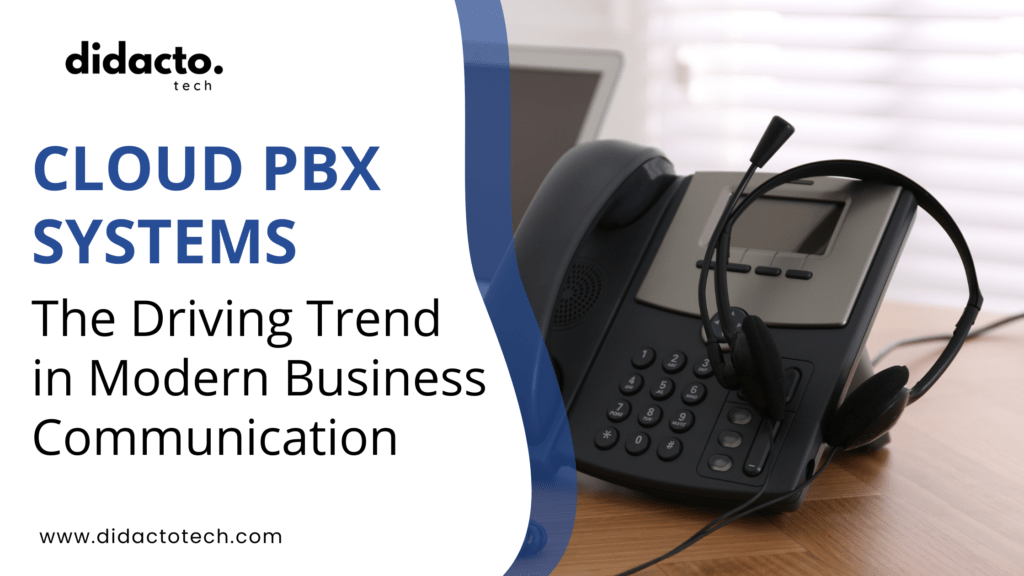Table of Contents
Introduction: A Shift Towards Cloud-based Communications
Defining Cloud PBX Systems
A Cloud PBX System, also known as a virtual PBX or hosted PBX, is a modern communication solution where data storage, networking, and processing tasks are done over the internet rather than on a computer or other hardware in a business premises.
Historical Context: Traditional Versus Modern Communication Systems
Historically, businesses have relied on traditional landline PBX systems that required physical installation and management. Changing times, however, have seen the shift from analog to digital communication with Cloud PBX Systems taking the front seat.
The Adoption Curve: The Global Move to Cloud PBX Systems
According to the Global Market Insights 2021 report, the global PBX market share is expected to grow at a rate of 15% from 2021 to 2026. Cloud PBX is progressively becoming a foundational component of business communications, and it’s easy to see why.
Economic Benefits: Affordability and Scalability
Cost-savings vs. On-Premise Models
Cloud PBX systems effectively eliminate the initial expense and ongoing costs of setting up and maintaining traditional on-premise phone systems. This Infotech Research Group report shows that businesses save up to 40% on phone costs when they switch to cloud-based PBX solutions.
How Scalability Translates to Business Flexibility
With cloud PBX, businesses can scale their communications up or down on-demand, giving them the flexibility to adapt to ever-changing business needs.
Financial Impact of Switching to Cloud PBX Systems
Switching to Cloud PBX Systems also reduces long-distance call charges and maintenance costs, which significantly impacts a company’s bottom line.
Enhanced Features and Performance
Seamless Call Handlings with Unified Communication
Unified Communication (UC) is a system that integrates various communication methods within a business. That means your email, text, call, fax, and conferencing services could all be conducted from a single dashboard.
Improved Call Quality: Breaking Down the Technology
Cloud PBX uses Voice Over Internet Protocol (VOIP) technology for its operations. VOIP typically offers clearer voice quality and less noise compared to traditional landline communications.
Advanced Features: Voicemail to Email, Call Forwarding and Auto Attendant
With advanced features like voicemail to email, call forwarding, and auto attendant, businesses optimize their processes for better efficiency and customer experience.
Reliability and Disaster Recovery
High Availability: The Promise of Constant Connectivity
One of the major advantages of a cloud PBX system is its ability to offer consistent, reliable communication platforms. Even during peak usage times, businesses can rely on cloud PBX’s constant connectivity.
Disaster Recovery Features: Safeguarding Business Continuity
The cloud-based nature of the PBX system facilitates robust disaster recovery solutions, ensuring continuity in the face of unforeseen events like power outages.
The Uptime Guarantee: How Cloud PBX Systems Ensure Constant Operations
Most service providers guarantee a 99.99% uptime for their Cloud PBX systems, fortifying its reliability advantage over traditional PBX systems.
The Future of Cloud PBX Systems
Evolving Business Needs: How Cloud PBX Systems Will Adapt
With constant advancements in technology, cloud PBX systems will reflect these changes, revolutionizing the way businesses communicate and function.
Technological Developments Affecting Cloud PBX Systems
Artificial Intelligence (AI), automation, and advanced analytics are expected to play significant roles in the future development of cloud PBX systems, enhancing efficient communication and decision-making capabilities.
Predictions: The Growth Trajectory of Cloud PBX Systems Adoption
A positive future is anticipated for the Cloud PBX market, as it’s projected to witness an average yearly growth of 11% during the forecasted timeframe. Among the key growth propellants is the rising acceptance of cloud-based communication tools by companies. Various advantages provided by Cloud PBX, such as cost-effectiveness, scalability, adaptability, and enhanced cooperative capabilities, are fueling its requirement in diverse sectors. The numbers show that cloud PBX adoption is a trend set to continue its upward trajectory well into the future.
To Conclude: Cloud PBX Systems as the Cornerstone of Business Communication
Summary: Why the Future is Cloud-based?
In this digital age, cloud PBX systems offer advantages that are invaluable to businesses. Its cost-effectiveness, scalability, advanced features, reliability, and futuristic relevance place it as the cornerstone of business communication.
Implications for Businesses: Making the Switch
Making the shift to cloud PBX system is not just a trend, but a strategic decision that can give businesses a competitive edge.
In the era of digital transformation, Cloud PBX systems stand as a powerful solution in the ever-evolving business communication landscape.”
In a nutshell, a shift towards Cloud PBX not only signifies adoption of a cost-effective solution but also reflects a business’s efforts to stay current and competitive in a world embracing digital transformation at a rapid pace. With benefits ranging from cost savings to advanced features, it’s certainly a communication trend worth considering for modern businesses.
Thanks for reading!
FAQs
-
What is a cloud-based PBX?
A cloud-based PBX, also known as Cloud PBX, is a business telephony system where data is stored and transferred over the Internet, rather than on traditional hardware.
Instead of being housed within your organization’s physical location, the entire PBX system is hosted in the cloud. This means calls can be made and received over the Internet, significantly reducing costs, enhancing flexibility, and offering a wide range of features not available in traditional telephony systems.
-
What is the difference between cloud PBX and traditional PBX?
While both systems enable businesses to connect with customers and clients, there’s a significant difference in how they operate.
Traditional PBX or Private Branch Exchange system is on-premise hardware that routes incoming and outgoing calls. It demands heavy upfront costs for installation, maintenance, and tending to regular manual updates. Furthermore, it may fall short when your business experiences growth due to its limited scalability, calling for another round of significant investment.
On the other hand, Cloud PBX is hosted in the cloud and thus, rids businesses of the above-listed challenges. Easy to set up, it offers scalability, cost-effectiveness, and advanced features for businesses. You only need an internet connection and you can have your office anywhere.
-
What is the advantage of cloud PBX?
One cannot ignore the numerous advantages of cloud PBX systems in the modern business environment. Some of these include:
Cost-Effectiveness: With no need for expensive hardware, the costs for setup, maintenance, and updates are significantly reduced. You don’t need a specialized technician; upgrades and additional functionalities can be integrated automatically or at the click of a button.
Flexibility and Scalability: Whether your company is growing or downsizing, you can easily adjust with a Cloud PBX system.
Advanced Features: Features like auto-attendants, voicemail to email, call forwarding, and many more are readily available with Cloud PBX systems.
Remote Work: In today’s work-from-anywhere world, Cloud PBX allows your employees to connect from anywhere with an Internet connection. -
What is a PBX system used for?
PBX stands for Private Branch Exchange, which essentially is a private network used within a business for communication. Traditionally, they were used to manage outgoing and incoming phone calls.
Today, they’ve evolved and cater to different forms of communication like text messages, video conference calls, and Internet phone systems, becoming an integral part of unified communication services for businesses.




